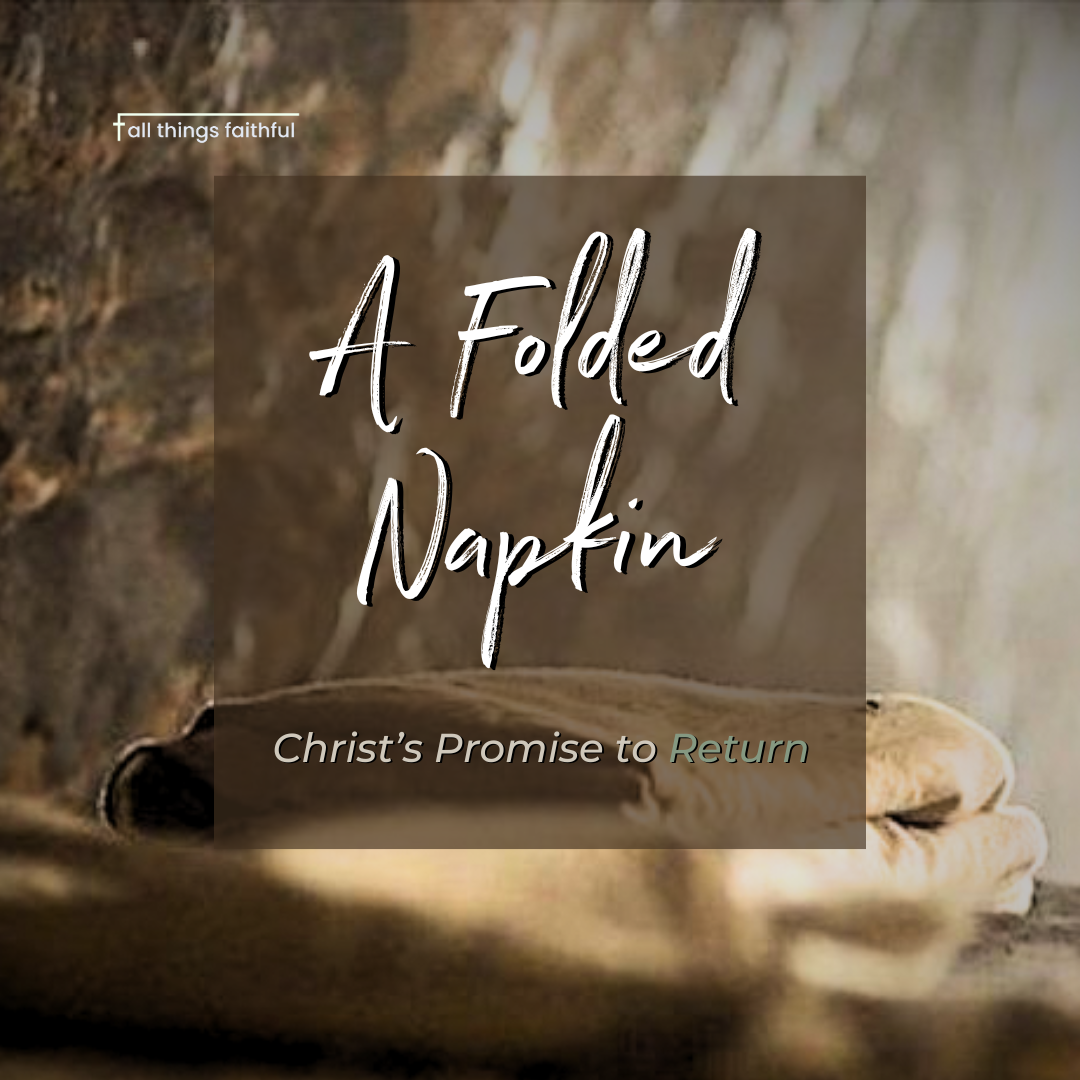
A Folded Napkin – Christ’s Promise to Return
“Then Simon Peter came, following him, and went into the tomb. He saw the linen cloths lying there, and the face cloth, which had been on Jesus’ head, not lying with the linen cloths but folded up in a place by itself.” John 20:6-7 (ESV)
Today is Easter Sunday, the day when Jesus rose from a cold tomb to fulfill the promise of restoration and redemption promised by God. Many Easter Day sermons and devotionals focus on our Risen Lord and the empty tomb, and we join Christians everywhere celebrating Christ’s victory over death.
Today, we want to remember not just the empty tomb, but something that was left behind.
In the quiet solemnity of that tomb, where the shadows of grief lingered, a folded napkin delivered a message of hope and a promise that resonates through the ages. A folded napkin, the linen that covered Jesus’ face.
Resurrection Morning
John’s Gospel provides a vivid account of resurrection morning. Mary Magdalene, the first to visit the tomb, finds the stone rolled away and the tomb empty.
In a state of despair, she runs to tell Peter and John, who then come to see for themselves. They find the linens that had enveloped Jesus’ body, and notably, the cloth that had been placed over His face, folded neatly and set apart from the other grave clothes (John 20:6-7).
Historical and Cultural Context
To understand the folded napkin, we must consider the historical and cultural context of the time. In Jewish tradition, the act of folding the napkin had a specific meaning.
When a servant set the dinner table for the master, he made sure it was exactly the way the master wanted it. The table was furnished perfectly, and the servants would wait, out of sight, until the master had finished eating.
If the master finished dining, he would rise from the table, wipe his fingers and mouth with the napkin, and toss it onto the table. The thrown napkin signaled that he was done.
If, however, the master got up from the table, folded his napkin, and laid it beside his plate, the servant would not dare touch the table because the folded napkin signaled that the master would return.
A Personal Message from the Master
The folded napkin in the tomb was far from a casual act; it was a deliberate sign from Jesus, our Master. It was His personal message that He was not done. He had not simply thrown aside His earthly life as if to say, “I am finished.” Rather, He left a folded napkin saying, “It is finished,” this part of His earthly mission.
This act of leaving a folded napkin ties beautifully with the words Jesus spoke at the Last Supper, “I will come again and will take you to myself, that where I am you may be also” (John 14:3).
The act of folding the napkin is an intimate assurance of this promise. It’s as if Jesus was echoing throughout time, “I am coming back for you.”
The Hope of His Return
Christ’s resurrection is the pivotal moment of our faith, the foundation upon which all our hope is built. The empty tomb and the folded napkin are the physical proof that our Savior lives, and because He lives, we also have the promise of eternal life.
The Apostle Paul expounds on this in 1 Corinthians 15:20-22, proclaiming that Christ’s resurrection is the firstfruits of those who have fallen asleep.
The Assurance for Believers
For all believers, the folded napkin is a symbol of Jesus’ meticulous care and intentionality. He did not leave His disciples in disarray; He left them with an orderly sign that He had conquered death and that He would uphold His word to return.
This is echoed in the book of Revelation, where the promise of His coming is affirmed: “Behold, I am coming soon” (Revelation 22:12).
Living in Anticipation
Knowing that Jesus is returning should influence the way we live our lives today. Just as the servants in the parable watched for their master’s return, we too are called to live in a state of readiness, serving faithfully and watching expectantly for His second coming.
The folded napkin is not just a historical anecdote; it’s a call to action, an invitation to live in a manner worthy of His gospel.
Sharing the Good News
As we contemplate the folded napkin, let us also be messengers of this good news. In a world that often feels chaotic and uncertain, the message of Jesus’ intentional return brings peace and order.
We are to share the hope of His return with others, extending the invitation to partake in the eternal banquet He has prepared.
A Reminder of His Faithfulness
The folded napkin left in the tomb is a timeless reminder of Jesus’ true nature, His promise, and His faithfulness. Let this strengthen our hearts and renew our minds, encouraging us to trust in His word and to anticipate His return with joy and expectation.
May the folded napkin remind us that the story is not over; our Master has risen, and He will surely return. Let us live with praise on our lips, serving with eagerness, loving with His love, and looking forward to the glorious day when our faith shall be sight, and we shall see our returned King face to face.
May God continuously lead your path


